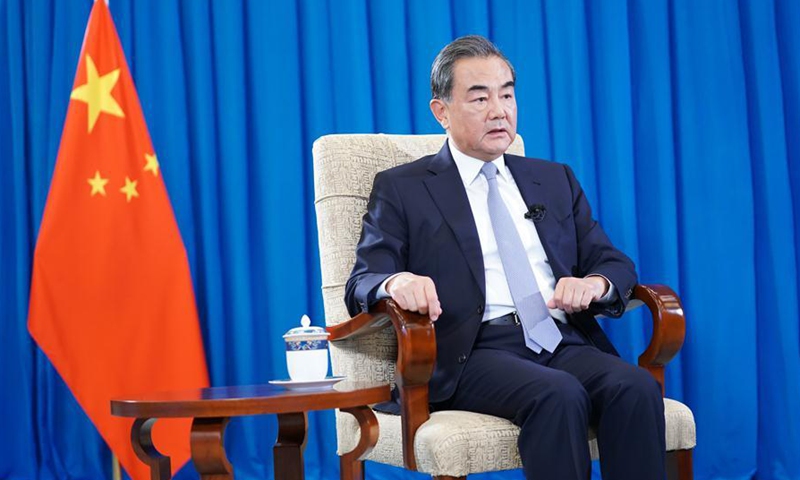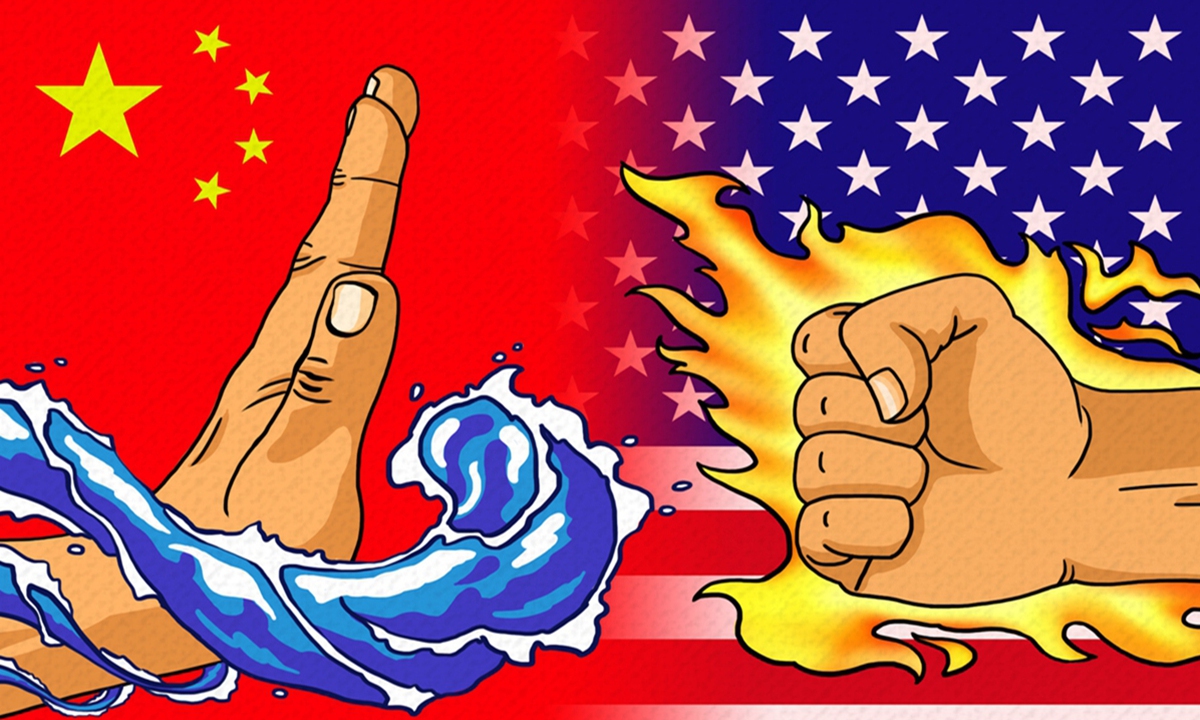Subtle change, consistent stance in FM Wang’s message to US
By Cao Siqi and Fan Anqi Source: Global Times Published: 2020/8/6 22:48:40 Last Updated: 2020/8/6 23:58:58
Unexpected turn of ties may not be ruled out before the US election

Chinese State Councilor and Foreign Minister Wang Yi Photo:Xinhua
As the US is trapped in political turmoil and its diplomacy seemingly has entered an anarchic state manifested by its wanton and crazy assaults against China, Chinese State Councilor and Foreign Minister Wang Yi vowed to cool off tensions and set out a clear framework for bilateral relations, showing that China will always maintain rational and strategic willpower in discourse while preparing for any bumps in the road ahead.
"Avoid confrontation, keep the channels open for candid dialogue, reject decoupling and stand up to shared responsibilities," Wang said in an interview with the Xinhua News Agency on Wednesday, drawing a clear-cut framework needed for the China-US relationship.
"China is ready to restart the dialogue mechanisms with the US side at any level, in any area and at any time. All issues can be put on the table for discussion," he noted.
Compared with previous conversations with foreign officials in recent months in which Wang showed a hard line approach toward the US and called on countries to "resist" unilateral and hegemonic acts, the subtle change in rhetoric highlighted China's consistent stance: It has no intention of escalating tensions with the US and is willing to cool down the situation.
China would not forgo a stable, mutually beneficial relationship even amid the recent destructive moves by the Trump administration, Li Haidong, a professor at the Institute of International Relations at the China Foreign Affairs University, told the Global Times on Thursday.
The framework has provided a guideline and set a positive tone for the long-term development of China-US relations, proposing a Chinese plan to resolve the setbacks in the relationship, he said.

Who are the dangerous "bridge breakers" of the China-US ties? Illustration: Liu Rui/GT
China refuses to decouple with the US and will not only establish closer ties with the US, but also with the world. Those who follow the global trend toward development and progress will take the upper hand and gain more support, he added.
Wang's conciliatory tone was interpreted by some people as a kind of compromise in intensifying disputes as they believed China is more concerned about the deteriorating trend. However, Chinese observers stressed that on the contrary, it demonstrated that China has recognized the true face of the Trump administration, which has been provoking anger and fear among Americans by portraying China as an external threat to cover up their incompetence.
"China does not want to become 'crazy' like the US. No matter how many 'bricks' the US has and plans to throw at China, China will remain rational and restrained," said Lü Xiang, a research fellow at the Chinese Academy of Social Sciences in Beijing. "But China has prepared for the worst of the worst."
The current China-US frictions have been described by many Western media outlets as a downward spiral toward the lowest point, while Wang said it is "the most complicated situation" since the establishment of diplomatic ties.
Diao Daming, an associate professor at the Renmin University of China in Beijing, said it implies a potential turning point between the two countries as long as China and the US are willing to engage in peaceful dialogue.
China has shown a clear attitude toward the world. While the US unilaterally shut its door for dialogue, China insists on solving issues with an open, honest mentality. It sent a message to US politicians: China is not interested nor will it interfere in US internal affairs. China's attitude toward the US will never change despite the rotation of ruling parties, Diao stressed.
Facts have proven that China-US cooperation has never been a case of one giving favor to the other, or one taking advantage of the other. Both countries have benefited much from this cooperation as statistics show that China-US business ties support 2.6 million jobs in the US. Trade with China helps each American family save $850 every year. Over 70,000 American businesses have made investments in China with a total sales volume of $700 billion. Among them, 97% are making a profit.
Even with the trade friction and COVID-19 pandemic, the vast majority of US companies in China still want to stay and are doubling down on investment in China.

Illustration: Liu Rui/GT
Unexpected moves
Given that Trump's only goal in the next three months is to win the election, observers pointed out that he is expected to use all possible means, be it to exert extreme pressure on China or to create unexpected opportunities to ease tensions with China's top leaders.
But no matter what path he chooses, "he only aims to portray an image to his supporters, that is, only he in the US, can manage relations with China," Lü noted.
Shi Yinhong, a professor of International Relations and Chairman of the Academic Committee of the School of International Studies, suggested that China could negotiate with the US on certain major issues such as the South China Sea and the Taiwan question, because a comprehensive improvement in bilateral ties is unlikely in the near future.
In the interview, Wang Yi said that China is willing to conduct various forms of communication and dialogue with the US at all levels.
The upcoming review of the progress of the phase one trade deal has been widely considered as a valuable communication channel for both sides.
Analysts believed that meetings or communication between high-level military and diplomatic officials from both sides may be under consideration. Speculation is also surfacing over whether the top leaders of the two sides will have a phone call that has occurred several times before at critical moments.
But Shi said such communication should not be overly anticipated. "It is impossible for Trump to make any sincere commitment," Shi warned. "If the US does not show enough sincerity, telephone diplomacy may be able to solve certain partial problems within a period of time, but in the long run, bilateral relations will still suffer more damage due to the US' breach of trust."
It is commonly recognized that current relationship between China and the US is extremely abnormal and the two sides need to create more opportunities to communicate. In fact, there has always been a lot of deft diplomacy between China and the US since 1970s. Even in the worst of times, both sides have been able to make such contact and release information.
Under such special circumstance, the meeting between Shanghai mayor Gong Zheng and the US Ambassador to China Terry Branstad on Thursday, is believed to release such information.
In the meeting, Gong reaffirmed the city's ambition to continue open up. As China's largest economic center and front window to opening-up policies, Shanghai remains a significant bridge toward China-US economic and trade ties and holds frequent exchanges with San Francisco and other sister cities, Gong said.
Chinese analysts urged the Trump administration, or the next administration, to abandon its fantasy of remodeling China to US needs and resume dialogue mechanisms at all levels in all fields.